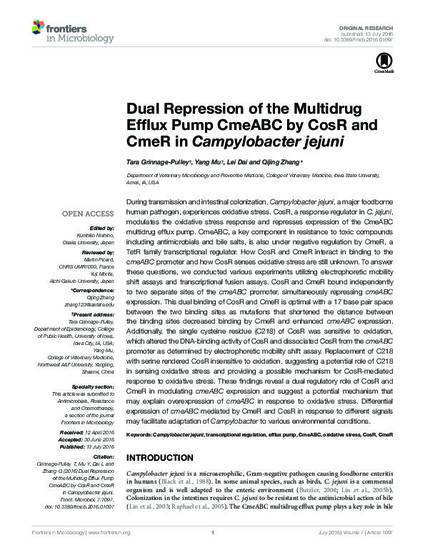
During transmission and intestinal colonization, Campylobacter jejuni, a major foodborne human pathogen, experiences oxidative stress. CosR, a response regulator in C. jejuni, modulates the oxidative stress response and represses expression of the CmeABC multidrug efflux pump. CmeABC, a key component in resistance to toxic compounds including antimicrobials and bile salts, is also under negative regulation by CmeR, a TetR family transcriptional regulator. How CosR and CmeR interact in binding to the cmeABC promoter and how CosR senses oxidative stress are still unknown. To answer these questions, we conducted various experiments utilizing electrophoretic mobility shift assays and transcriptional fusion assays. CosR and CmeR bound independently to two separate sites of the cmeABC promoter, simultaneously repressing cmeABC expression. This dual binding of CosR and CmeR is optimal with a 17 base pair space between the two binding sites as mutations that shortened the distance between the binding sites decreased binding by CmeR and enhanced cmeABC expression. Additionally, the single cysteine residue (C218) of CosR was sensitive to oxidation, which altered the DNA-binding activity of CosR and dissociated CosR from the cmeABC promoter as determined by electrophoretic mobility shift assay. Replacement of C218 with serine rendered CosR insensitive to oxidation, suggesting a potential role of C218 in sensing oxidative stress and providing a possible mechanism for CosR-mediated response to oxidative stress. These findings reveal a dual regulatory role of CosR and CmeR in modulating cmeABC expression and suggest a potential mechanism that may explain overexpression of cmeABC in response to oxidative stress. Differential expression of cmeABC mediated by CmeR and CosR in response to different signals may facilitate adaptation of Campylobacter to various environmental conditions.
Available at: http://works.bepress.com/qijing-zhang/34/

This article is published as Grinnage-Pulley, Tara, Yang Mu, Lei Dai, and Qijing Zhang. "Dual Repression of the Multidrug Efflux Pump CmeABC by CosR and CmeR in Campylobacter jejuni." Frontiers in Microbiology 7 (2016): 1097. doi:10.3389/fmicb.2016.01097. Posted with permission.